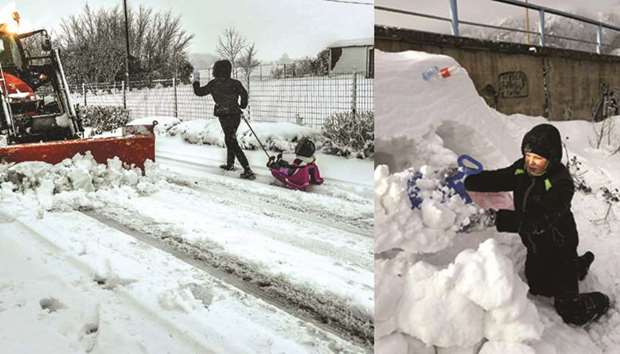High winds and heavy snow in Europe yesterday stranded thousands of travellers, kept schoolchildren at home and even played havoc with international diplomacy.
It was the second day running of nasty weather across the continent, with Britain still digging out from its deepest snowfall in four years.
The snowed-over runways in Brussels provoked about 90 flight cancellations and some 100 delays yesterday, including for the plane carrying Israel’s Prime Minister Benjamin Netanyahu back home.
He tweeted a video from his plane that opened with a shot of the white tarmac at the close of his European visit marked by the US recognising Jerusalem as Israel’s capital.
A scheduled meeting between Netanyahu and European Commission President Jean-Claude Juncker was called off because of the weather, officials said.
Brussels airport advised passengers to stay away, as staff were trying to de-ice planes and clear snow from the runways.
“Heavy snowfall: do not come to the airport until further notice,” the airport said on Twitter, adding that passengers should check the status of their flights.
The national carrier, Brussels Airlines, said on Twitter that the majority of its flights were cancelled, except for several long-haul flights to Africa and some to the United States.
Some flights were rerouted via the domestic airports of Liege and Charleroi, as well as Luxembourg and the German airport of Dusseldorf.
Travellers took to Twitter to vent their frustrations about being stuck on planes that were unable to take off for hours, allegedly without being given food and water.
Meanwhile, road traffic in Brussels was severely disrupted after local authorities decided to close inner city tunnels, while public transport experienced severe delays, with most buses unable to operate.
During the day, the Belgian website Touring Mobilis recorded 1,200km of traffic jams in the entire country, a record for 2017.
The Royal Meteorological Institute of Belgium is expecting several centimetres of Snow in the evening and overnight, as well as the formation of black ice, and has issued a so-called orange alert.
Snow wreaked havoc in the low-lying Netherlands, briefly closing down Eindhoven airport, shutting schools and leading to transport chaos with hundreds of flights and trains cancelled or delayed.
The rare winter show may have delighted children, who once again set off in search of any slope on their sledges, but it proved a headache elsewhere as the National Weather Centre (KNMI) issued its highest code red warning.
Schiphol airport, just outside Amsterdam, was forced to cancel 430 flights already by early afternoon – about one-third of all of flights in or out of one of Europe’s top five busiest air hubs, and many others faced long delays.
“We are de-icing the planes for their safety and we have snow crews out trying to keep the runways clear and remove the snow, but they can’t keep up,” Schiphol spokesman Paul Weber told AFP.
“People should keep in touch, look at the website, and find out how to reach us as the trains are having difficulty,” he said, warning that even though most of the snow was supposed to melt by today, there would likely still be flight delays.
Eindhoven airport, the country’s second biggest, said just after midday on Twitter that “due to wintry weather conditions, the runway is currently closed”.
It reopened about three hours later, but some flights were still being diverted or cancelled.
The Hague airport were also faced with delays and cancellations.
The Dutch road safety association ANWB reported that roads were clogged around 6.30pm with 1,385km of traffic jams reported around the country due to the icy conditions.
The snow arrived in The Netherlands early on Sunday, and by late yesterday the weather centre had extended its code red warning across virtually the whole of the country, to include also the northern regions including Friesland and the city of Groningen.
It warned “of wide-spread icy conditions” while in the west the snowfall would be accompanied by “a powerful and strong northeast wind” which could cause Snow drifts.
For those who struggled into work yesterday, the national railway NS had but one message. “Go home as early as possible to avoid travel problems.”
“Travellers should take into account that there will be longer travel times,” it warned on its website, adding it was running a reduced service.
Bus services in many cities including The Hague, Amsterdam and Utrecht were also halted by early evening, after many had trouble navigating the slippery roads.
But it was not just knee-high snow that was causing trouble, with winds of up to 150kph (93mph) forecast along France’s Atlantic Coast.
Some 120,000 people were without power in France as storms that caused a ferry to run aground in Calais on Sunday continued to sweep the centre and west of the country.
Brutal winds shut down ferry service between the southern Spanish port of Algeciras and Tangiers in Morocco, while also shuttering some schools in southern Spain.
At the same time, Britain was recovering after heavy snow brought freezing temperatures, shutting hundreds of schools and disrupting flights for a second day.
Power was restored to more than 100,000 homes, while airports tried to recover their schedules following the winter’s first major snowfall – the biggest in four years.

A child pulled in a sled yesterday passes by a snowplough clearing a road in Godewaersvelde, northern France. RIGHT: A boy constructs a den inside a heap of snow on the bank of the Yenisei River, in the Siberian town of Divnogorsk, Russia.
